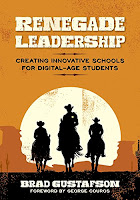Renegade Leadership by @GustafsonBrad provides practical suggestions and personal
examples on building relationships when moving forward with pedagogy and
innovation. Brad provides guidance to school leaders and stresses the
importance of 21st Century Learning and how it impacts the culture of our schools.
The book and web site https://www.bradgustafson.com/ provide choice for our own professional learning as an
instructional leader.
I first met Brad at the @MACUL2015 conference in Detroit
Michigan. He was on an expert panel with other instructional leaders sharing
their varied experiences with movement of 21st Century Learning. As he I did
then and as in the book, I have been able to take valued advice and employ to my
own instructional leadership pathway.



